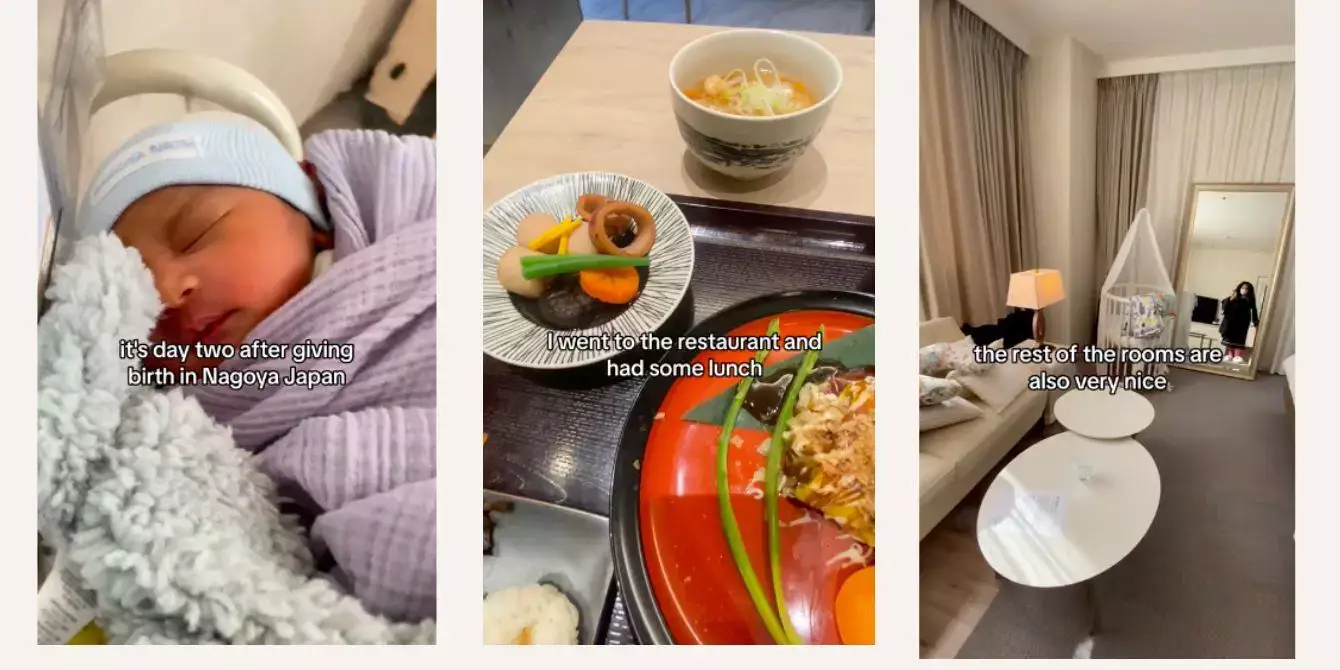A New Dawn for Maternal Care
The journey of motherhood is filled with joy, anticipation, and, often, complicating challenges. While many mothers in the U.S. grapple with a system that can feel unwelcoming and often burdensome—both in terms of emotional support and financial implications—those giving birth in Japan encounter a vastly different experience. The stark contrasts in care standards, environment, and post-natal support have come into sharp focus thanks to the viral insights shared by Nicole Patrice, an American mom who documented her recent birthing experience in Japan on TikTok.
For many women in the United States, the process of giving birth is frequently accompanied by a cycle of anxiety, not merely from the physical challenges of labor but also the financial repercussions. The burden of medical bills can be overwhelming, and stories of traumatic births, often exacerbated by feelings of discrimination or neglect, are not uncommon. Nicole’s retrospective look at her first delivery in Kentucky embodies this sentiment; she described the experience as “traumatic and discriminatory,” highlighting a systemic issue that leaves many new mothers feeling isolated and overlooked.
In contrast, Nicole’s recent experience at a birthing clinic in Nagoya, Japan, presents a refreshing narrative. Instead of facing a hastily sterilized environment and an impersonal, detached health care system, she found herself in a facility characterized by warmth, care, and attention—elements that should be foundational to any maternal health service.
The Nagoya Birth Clinic, where Nicole chose to deliver her second child, is far from an ordinary medical facility. It offers a suite designed for relaxation and comfort, where mothers can recuperate in a serene environment. Nicole’s video tour paints a picture not just of a hospital but of a retreat-like haven, where exceptional culinary experiences are tailored to promote healing—an astonishing contrast to the often bland and uninspired meals typically served in U.S. hospitals.
The Japanese approach to postpartum recovery emphasizes well-being. Nicole shared that, following her C-section, her pain management was effectively handled without reliance on heavy medications. The culture in Japan promotes a balanced perspective on health—prioritizing wellness rather than merely treating illness. This is a stark departure from practices prevalent in America, where pain management can sometimes lead to dependencies on stronger narcotics.
Beyond the physical recovery, the emotional support provided to new mothers in Japan underscores the communal approach to motherhood—one that values rest and bonding. Nicole highlighted spaces that encouraged familial connections and leisure activities, such as cozy reading areas and thoughtful amenities like an in-room water heater for tea and coffee. These offerings provide an atmosphere where women can recover not only as individuals but also as mothers fostering a bond with their newborns.
The sentiments expressed in the comments on Nicole’s TikTok videos reflect a collective yearning among viewers for similar care standards in the U.S. As various commentators pointed out, the need for a progressive, considerate approach to maternal care is crucial. It calls attention to the necessity of societal reflection on how the U.S. healthcare system can evolve to better serve families at one of the most vulnerable times in their lives.
The experiences of Nicole Patrice raise critical questions about how other countries, particularly the U.S., might re-evaluate their approaches to childbirth and postpartum care. The positive experiences reported in Japan serve as a model the American healthcare system should strive towards. More than just medical care, the journey into motherhood should encompass support systems that nurture mothers both emotionally and physically.
While no place is perfect, the structured support offered in Japan underscores a cultural ethos that cherishes motherhood. The collective wisdom gleaned from these observations beckons for systemic changes that could redefine maternity care in America, providing every mother with the dignity, support, and attention they deserve during a pivotal life transition. Through learning from the progressive practices abroad, we can take meaningful steps towards an ideal maternal care framework that values every mother and child, ensuring they receive the care they truly merit.


